7 Best Essential Oils for Sleep Apnea Relief You’ll Wish You Tried Sooner
Struggling with sleep apnea and looking for natural relief? While CPAP machines and medical treatments remain essential, more people are turning to essential oils to complement their sleep apnea management plan. In this guide, we’ll explore the 7 best essential oils to ease breathing and boost sleep quality, starting tonight.
Please note: The information provided is for educational purposes only and should not replace medical advice or prescribed sleep apnea treatments. Essential oils are complementary therapies and should never replace prescribed medical treatments for sleep apnea.
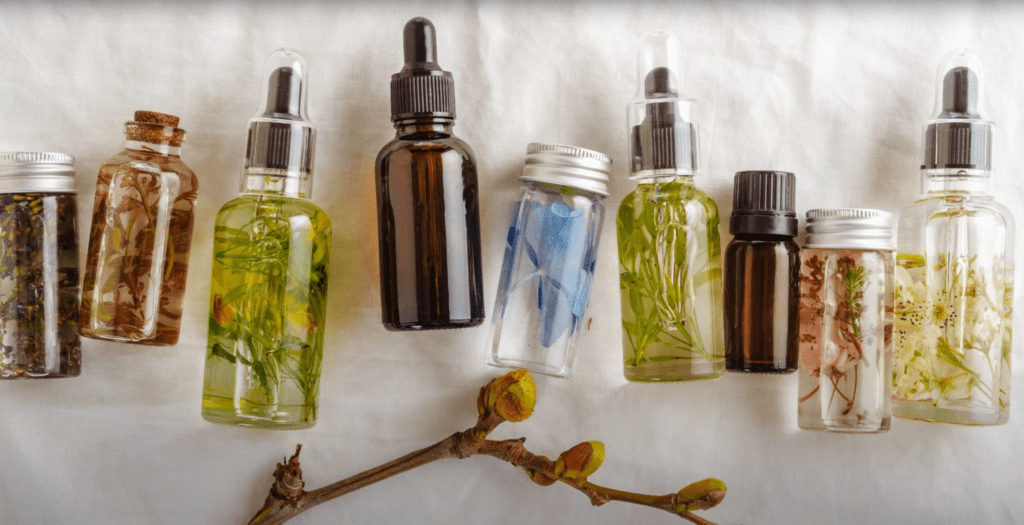
Disclosure: This article contains carefully selected affiliate links. We may make a small commission on qualifying purchases at no additional cost to you.
Why Essential Oils Help Sleep Apnea
Sleep apnea interrupts breathing during sleep, wrecking your rest and health. Essential oils can support your routine by:
- Opening airways and improving breathing
- Reducing inflammation in respiratory passages
- Promoting relaxation and stress reduction
- Supporting consistent sleep patterns
- Easing anxiety around using CPAP machines
The 7 Most Effective Essential Oils for Sleep Apnea
1. Lavender Oil: Sleep Quality Booster
Lavender oil stands out as the premier essential oil for sleep apnea support, backed by extensive research on its sleep-promoting properties.
Benefits of Lavender Essential Oil for Sleep Apnea:
- Improves overall sleep quality
- Reduces nighttime anxiety that keeps sleep apnea sufferers awake
- Promotes deeper, more restful sleep
- Soothes CPAP-related stress for a calmer bedtime routine
How to Use:
Diffuse 3-5 drops or mix 2-3 drops with a tablespoon of quality carrier oil (such as coconut or jojoba oil) and apply to your chest and neck for a soothing rub
Top Pick: Plant Therapy Lavender Essential Oil
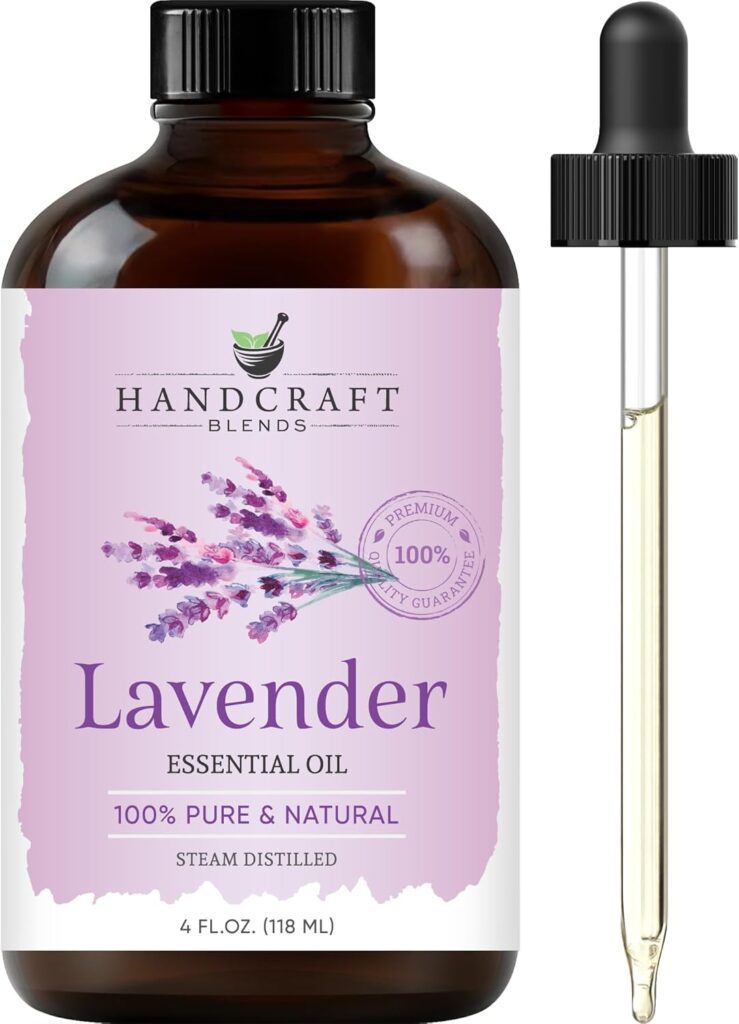
Why Plant Therapy Lavender Oil:
✔️ 100% pure, therapeutic grade
✔️ Perfect for diffusers or rubs
✔️4.5/5 stars (115,000+ reviews)
If you prefer a more convenient option, consider using a lavender spray to mist your bedroom before bed. Check out our list of the 6 Best Lavender Sprays for Restful Sleep and Deep Relaxation to find the perfect spray for your bedtime routine.
2. Peppermint Oil: Airway Opener
Peppermint oil’s natural decongestant properties make it particularly valuable for sleep apnea sufferers.
Benefits of Peppermint Essential Oil for Sleep Apnea:
- Clears stuffy noses that worsen sleep apnea symptoms.
- Eases throat inflammation for smoother breathing all night.
- Cooling effect helps you feel less clogged while sleeping.
How to Use:
Add 2-3 drops of peppermint oil to a bowl of hot water and inhale the steam for 5-10 minutes before bed or dilute 1-2 drops with a tablespoon of quality carrier oil (coconut, jojoba, or almond oil) and apply to your chest and throat area
Top Pick: Majestic Pure Peppermint Essential Oil
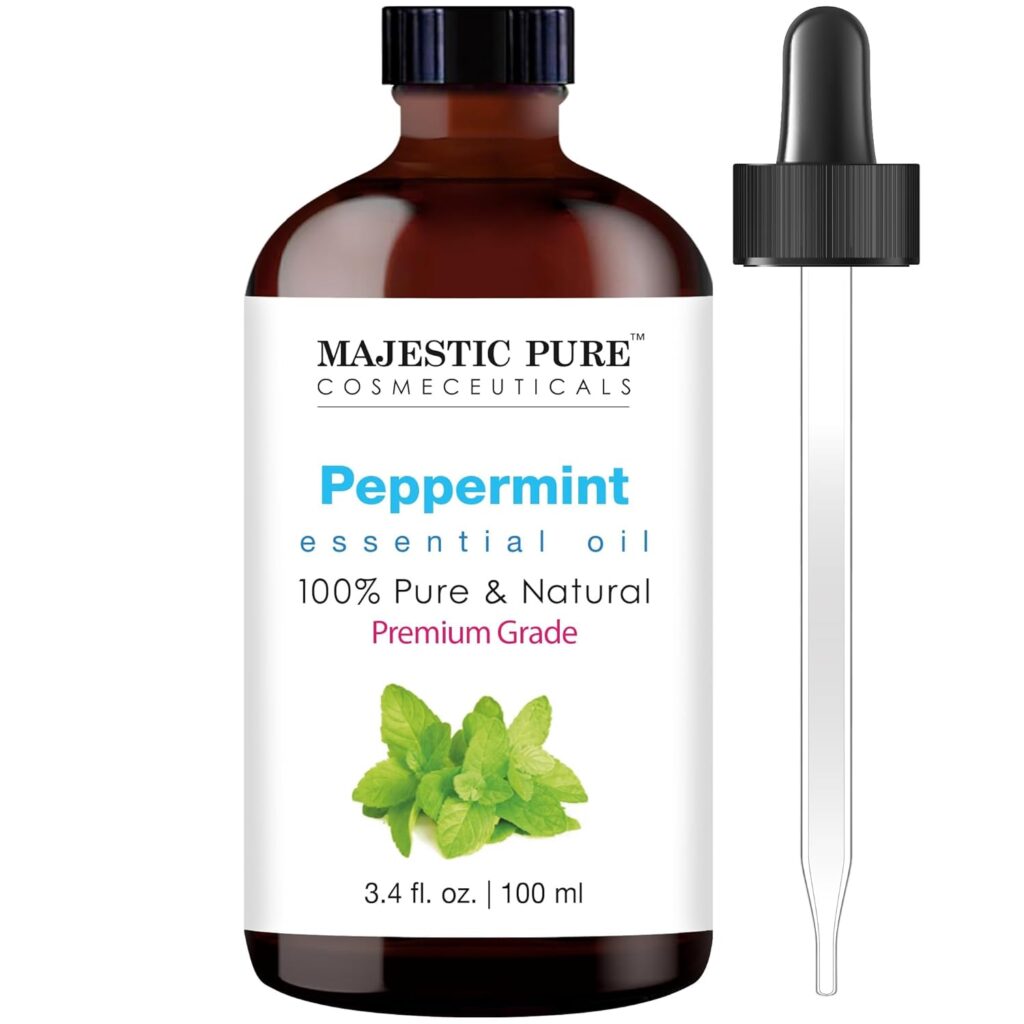
Why Majestic Pure Peppermint Essential Oil:
✔️ Pure, potent, and additive-free
✔️ Huge 4oz bottle
✔️ Ideal for steam or diffusion
3. Eucalyptus Oil: Breathing Enhancer
Eucalyptus oil is renowned for its powerful respiratory benefits, making it a natural ally for sleep apnea management—especially when congestion or allergies worsen symptoms.
Benefits of Eucalyptus Essential Oil for Sleep Apnea:
- Breaks up mucus that blocks airways during sleep apnea episodes.
- Opens nasal passages to reduce snoring and breathing pauses.
- Eases breathing struggles tied to colds or seasonal allergies.
How to Use:
Diffuse 3-4 drops in your bedroom or mix 2-3 drops with a tablespoon of quality carrier oil (such as fractionated coconut oil, lavender, lemon or Frankincense) and apply to your chest and throat area before bedtime.
Top Pick: Handcraft Blends Eucalyptus Essential Oil
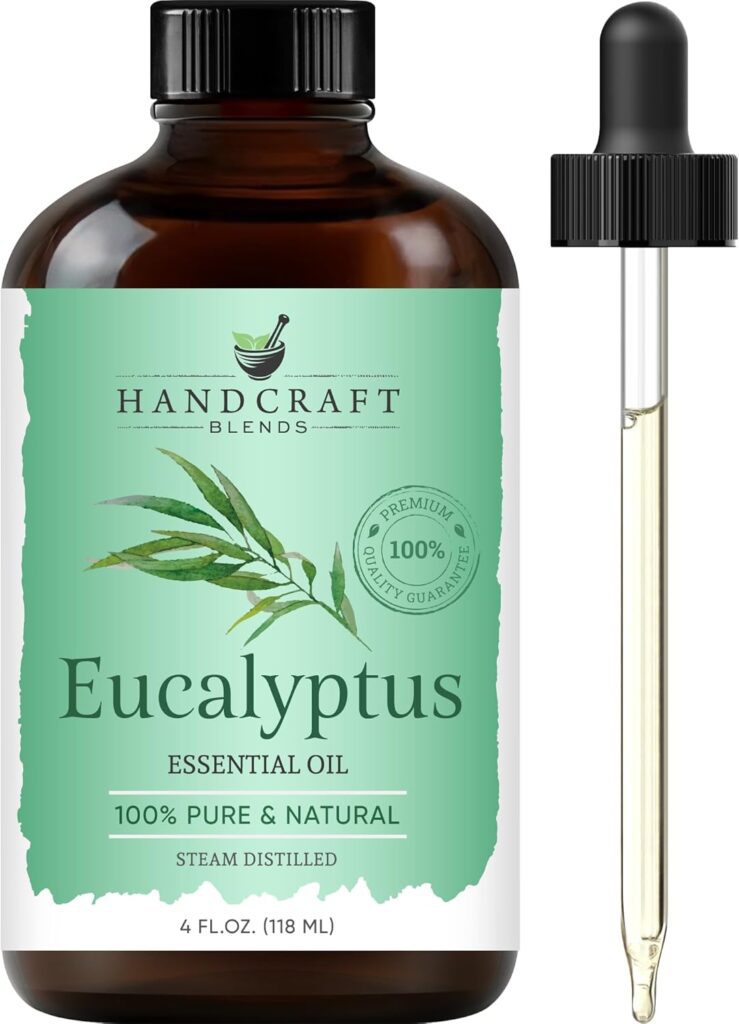
Why Handcraft Blends Eucalyptus Oil:
✔️ 100% pure with a crisp, clean scent
✔️ Lab-tested for quality assurance
✔️ Perfect for diffusion or topical relief
4. Thyme Oil: Airway Strengthener
Thyme oil’s antimicrobial and expectorant properties help clear airways and strengthen respiratory function, offering relief for sleep apnea sufferers prone to obstructions.
Benefits of Thyme Essential Oil for Sleep Apnea:
- Strengthens weak airways that collapse during sleep apnea.
- Clears congestion to prevent nighttime breathing disruptions.
- Reduces inflammation that tightens respiratory passages.
How to Use:
Dilute 1-2 drops with a tablespoon of quality carrier oil (fractionated coconut oil works best) and apply to your chest and throat, or add 2-3 drops to a diffuser for respiratory support.
Top Pick: SVA Thyme Essential Oil
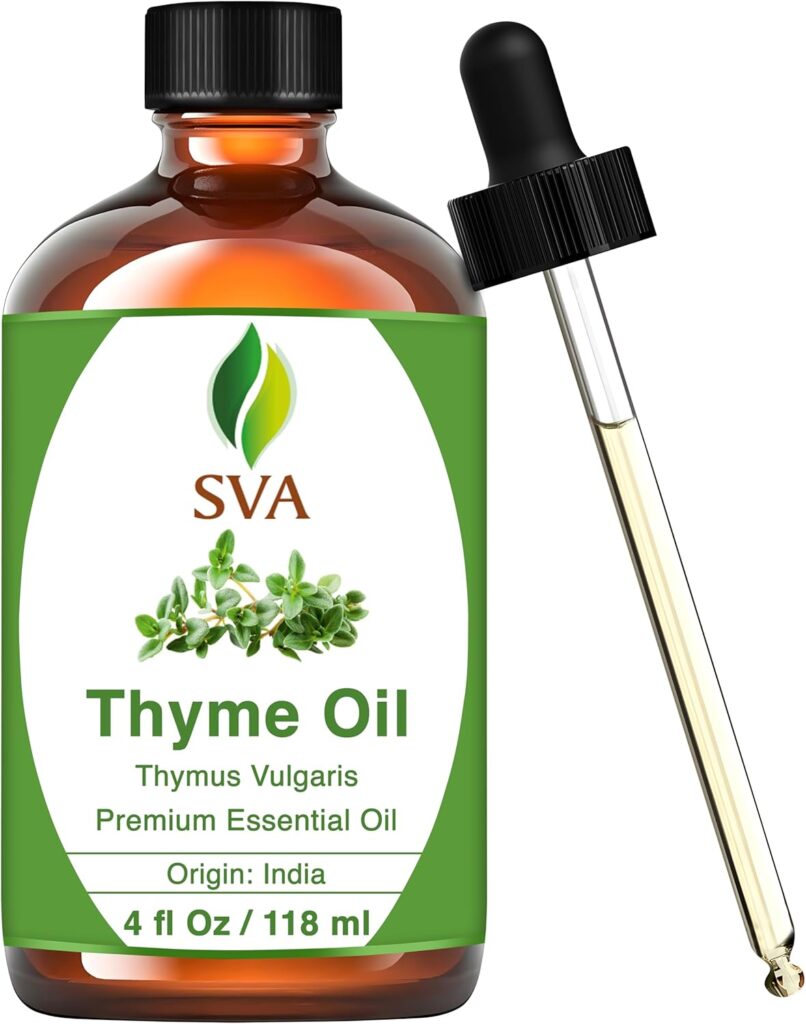
Why SVA Thyme Essential Oil:
✔️ 100% pure, free from preservatives
✔️ Comes with a precise dropper for easy use
✔️ Optimal for respiratory support blends
Important note: Due to its potent nature, start with a small amount and increase gradually as needed. Do not use it directly on skin and hair. Always dilute in a carrier oil first.
5. Marjoram Oil: Muscle Relaxer
Marjoram oil’s calming effects relax throat muscles and ease tension, making it a valuable tool for sleep apnea sufferers with airway obstructions.
Benefits of Marjoram Essential Oil for Sleep Apnea:
- Relaxes throat muscles to reduce apnea-related blockages.
- Eases pre-sleep anxiety that disrupts restful breathing.
- Promotes steady, uninterrupted sleep patterns.
How to Use:
Add 3-4 drops to your diffuser before bedtime or mix 2-3 drops with a tablespoon of quality carrier oil such as grapeseed, jojoba, rosemary or almond oil, and massage into your neck and chest.
Top Pick: Marjoram Essential Oil by Gya Labs
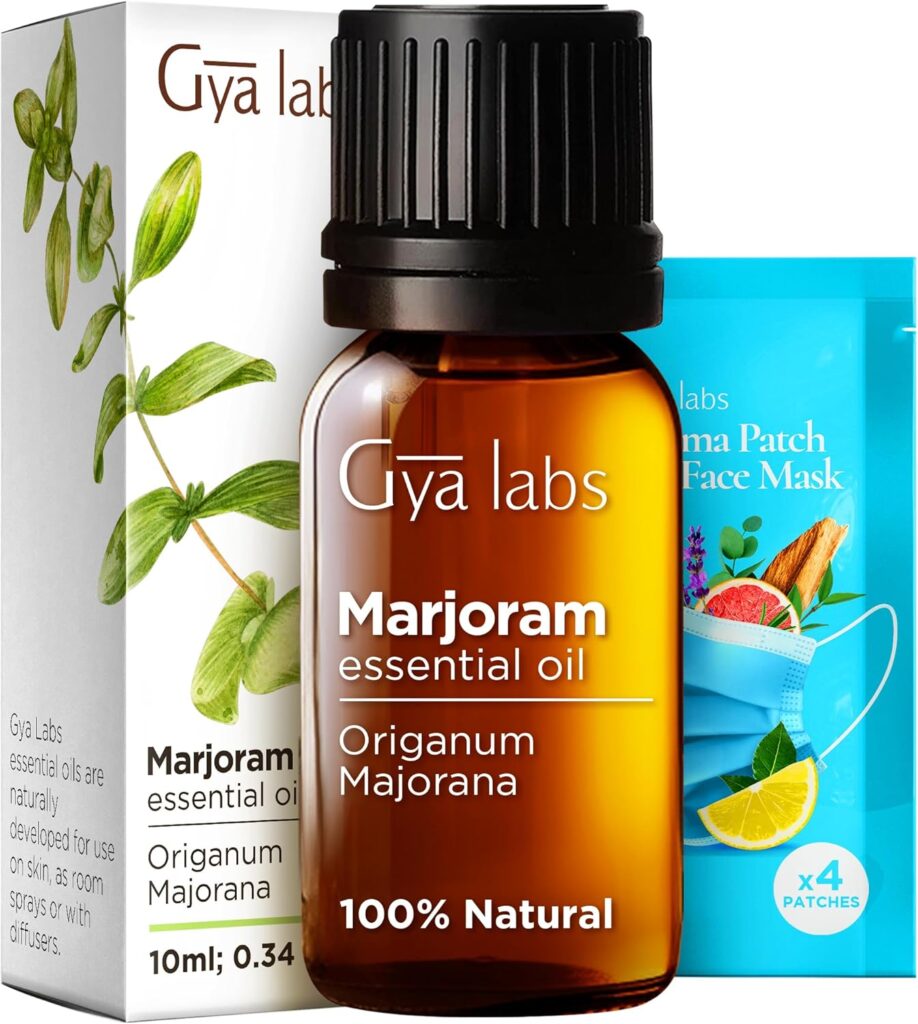
Why Gya Labs Marjoram Essential Oil:
✔️ 100% pure, therapeutic-grade Egyptian marjoram
✔️ Soothing minty-woody scent
✔️ Ideal for diffusion or relaxing rubs
6. Cedarwood Oil: The Sleep Promoter
Cedarwood oil’s grounding aroma regulates sleep cycles and calms the mind, helping sleep apnea sufferers achieve deeper rest despite interruptions.
Benefits of Cedarwood Essential Oil for Sleep Apnea:
- Boosts melatonin to restore sleep lost to apnea episodes.
- Calms racing thoughts that keep you awake after pauses.
- Supports consistent breathing with its earthy scent.
How to Use:
Diffuse 3-4 drops in your bedroom or mix 2-3 drops with a tablespoon of quality carrier oil (like sweet almond or coconut oil) and apply to your chest or soles of your feet before bed.
Top Pick: Cedarwood Essential Oil By UpNature
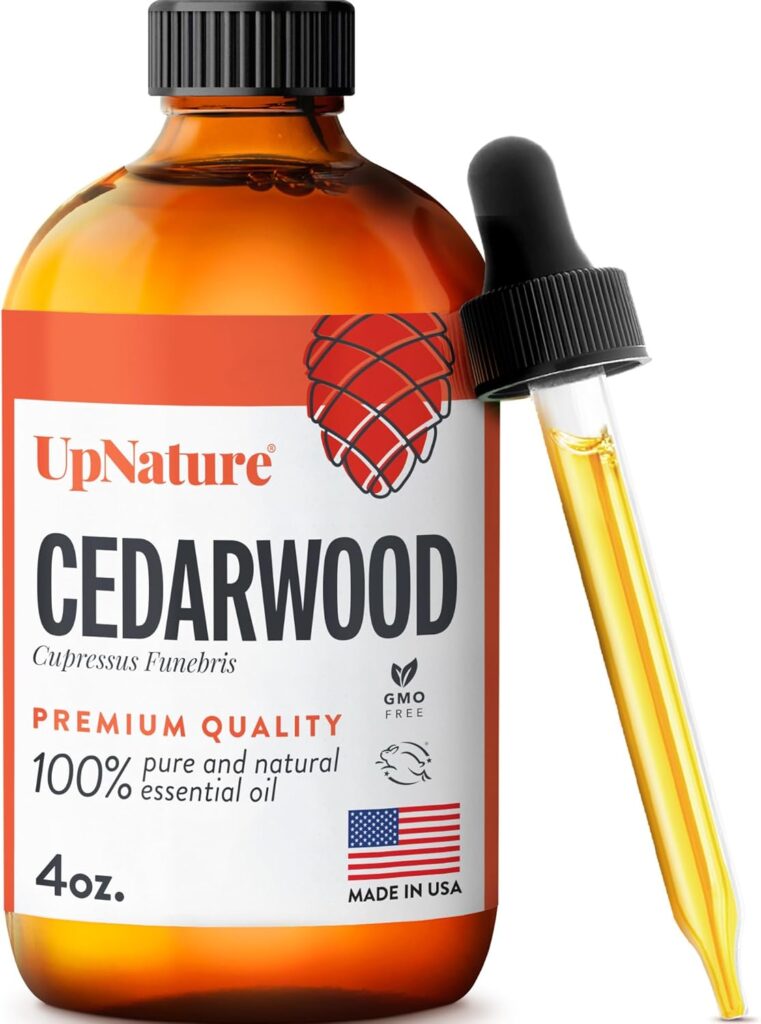
Why UpNature Cedarwood Oil:
✔️ 100% natural in a premium amber bottle
✔️ Perfect potency for sleep support
✔️ Backed by 14,000+ positive reviews
7. Vetiver Oil: Deep Sleep Ally
Known as the “Oil of Tranquility,” vetiver’s rich, earthy scent promotes profound relaxation, helping sleep apnea sufferers reclaim restful nights.
Benefits of Vetiver Essential Oil for Sleep Apnea:
- Quiets an overactive mind.
- Encourages deep sleep to recover from breathing pauses.
- Reduces CPAP-related stress with its grounding effect.
How to Use:
Add 2-3 drops to your diffuser before bedtime or mix 1-2 drops with a tablespoon of quality carrier oil (like jojoba oil) for a calming massage on your pulse points.
Top Pick: Gya Labs Vetiver Essential Oil
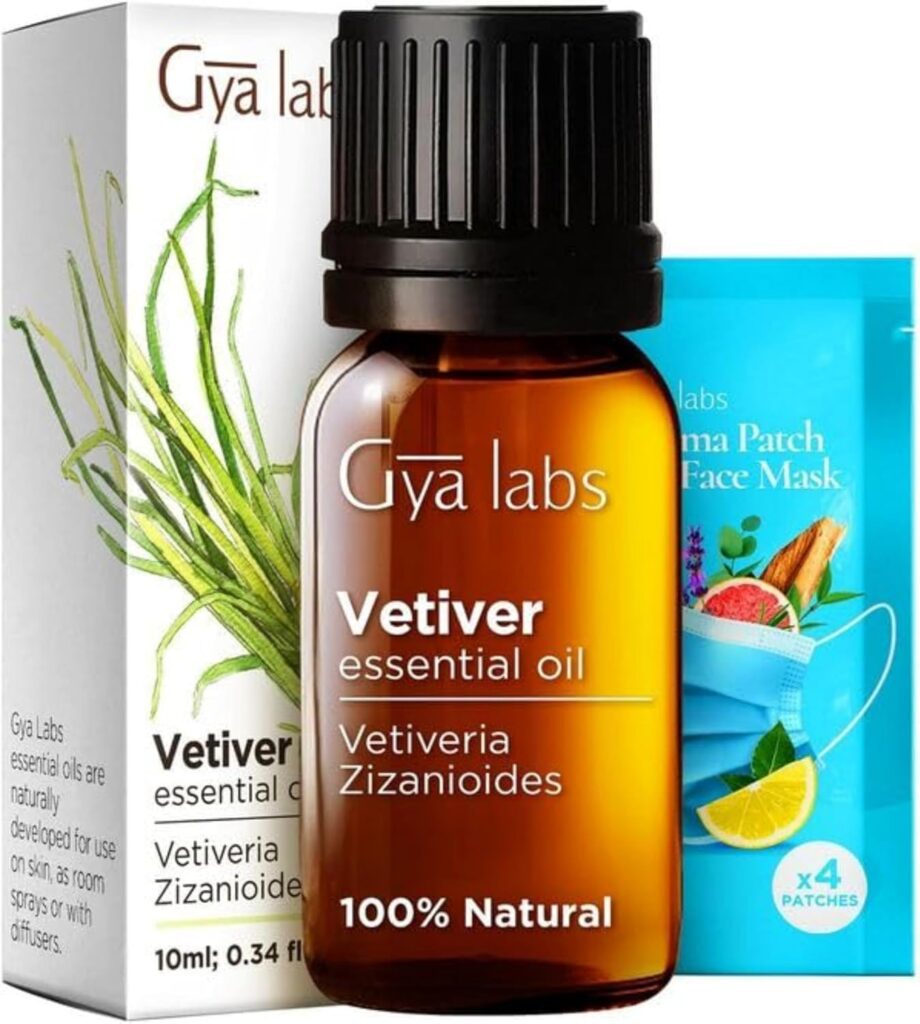
Why Gya Labs Vetiver Essential Oil:
✔️ 100% pure, natural vetiver from high-quality Indian vetiver roots.
✔️ Thousands of positive reviews on Amazon
✔️ Perfect for diffusers, aromatherapy, or DIY blends
Tips for Using Essential Oils for Sleep Apnea
- Always dilute essential oils: Mix them with a carrier oil before applying to the skin to avoid irritation. Good carrier oils include coconut oil, jojoba oil, and sweet almond oil.
- Start small: Begin with a small amount and gradually increase as needed. Everyone reacts differently to essential oils, so it’s important to find what works best for you.
- Use a high-quality diffuser: This will help disperse oils into the air for inhalation throughout the night. Look for ultrasonic or nebulizing diffusers for the best results.
- Create a bedtime routine: Incorporate essential oils into your nightly routine to signal to your body that it’s time to sleep. This could include diffusing oils, applying a diluted blend to your skin, or taking a relaxing bath with a few drops of oil.
- Experiment with blends: Try combining different oils to create a custom blend that works best for you. For example, you might mix lavender, cedarwood, and marjoram for a deeply relaxing blend.
- Be consistent: Use your chosen oils regularly for the best results. It may take some time to notice significant improvements in your sleep quality.
- Optimize your sleep environment: In addition to using essential oils, keep your sleeping area cool, dark, and quiet to maximize the benefits and promote better sleep.
- Consider timing: Some oils, like peppermint and eucalyptus, can be stimulating. Use these earlier in the evening, and switch to more calming oils like lavender or vetiver closer to bedtime.
- Clean your diffuser regularly: This prevents buildup of old oils and confirms you’re getting the full benefits of your essential oils.
- Store oils properly: Keep your essential oils in dark glass bottles in a cool, dry place to preserve their potency and effectiveness.
To get the most out of essential oils, incorporate them into a consistent bedtime routine. Whether you use them in a diffuser, as a pillow spray, or in a relaxing bath, consistency is key. Learn how to build a sleep routine that works for you by reading our guide on How to Establish a Healthy Sleep Routine.
Safety Considerations
While essential oils can be a helpful natural remedy, it’s crucial to use them safely:
- Never ingest essential oils: Unless under the guidance of a qualified aromatherapist, essential oils should not be taken internally.
- Always dilute: Pure essential oils are highly concentrated and can cause skin irritation if applied directly. Always mix them with a carrier oil before applying to the skin.
- Patch test: Before using a new oil, do a patch test on a small area of skin to check for any adverse reactions.
- Discontinue use if reactions occur: If you experience any negative reactions such as skin irritation, headaches, or nausea, stop using the oil immediately.
- Be aware of interactions: Some essential oils may interact with medications. If you’re taking any prescription drugs, talk to your healthcare provider before using essential oils.
- Use caution with certain groups: Pregnant women, children, and pets may be sensitive to certain essential oils. Always research or consult a professional before using oils around these groups.
- Avoid photosensitive oils before sun exposure: Some oils, particularly citrus oils, can make your skin more sensitive to sunlight. Avoid applying these to your skin before going outside.
- Use high-quality oils: Choose pure, high-quality essential oils from reputable sources to ensure you’re getting the full benefits without any harmful additives.
- Don’t overuse: More is not always better with essential oils. Stick to recommended amounts and don’t exceed safe usage guidelines.
- Keep oils out of reach: Store your essential oils in a safe place, out of reach of children and pets.
How Essential Oils Complement Medical Treatments for Sleep Apnea
While essential oils can be useful, they should be used as a complementary therapy alongside medical treatments for sleep apnea. Here’s how they can work together:
- Enhancing CPAP therapy: Some people find the use of a CPAP machine uncomfortable or claustrophobic. Using calming essential oils like lavender or chamomile in the bedroom can help create a more relaxing environment, potentially making CPAP use more tolerable.
- Improving overall sleep quality: Even with medical treatment, sleep apnea can still disrupt sleep patterns. Essential oils can help improve overall sleep quality, helping you feel more rested even if apnea episodes still occur.
- Reducing anxiety and stress: The stress of dealing with a chronic condition like sleep apnea can itself contribute to sleep problems. Essential oils can help reduce anxiety and promote relaxation, creating a more positive sleep experience.
- Supporting fat loss efforts: Obesity is a significant risk factor for sleep apnea, and fat loss is often recommended as part of treatment. Some essential oils, like grapefruit or peppermint, may help support fat loss efforts by reducing cravings or boosting metabolism.
- Addressing related symptoms: Sleep apnea can lead to other issues like dry mouth or sore throat. Certain essential oils can help address these symptoms, improving overall comfort.
Remember, while essential oils can be a valuable addition to your sleep apnea management plan, they should never replace prescribed medical treatments. Always work closely with your healthcare provider to ensure you’re addressing your sleep apnea effectively and safely.
Creating an Essential Oil Blend for Sleep Apnea
Combining different essential oils can create a powerful blend that addresses multiple aspects of sleep apnea. Here’s a sample essential oil recipe for sleep apnea that you can try:
Sleep Apnea Support Blend
- 3 drops Lavender oil
- 2 drops Eucalyptus oil
- 2 drops Cedarwood oil
- 1 drop Peppermint oil
- 1 drop Thyme oil
Mix these oils together and add to your diffuser, or dilute with 2 tablespoons of carrier oil for topical application.
This blend combines the relaxing properties of lavender and cedarwood with the respiratory benefits of eucalyptus, peppermint, and thyme. Adjust the ratios as needed based on your personal preferences and reactions to the oils.
Lifestyle Changes to Support Essential Oil Use for Sleep Apnea
While essential oils can be useful, combining their use with positive lifestyle changes can significantly improve your sleep apnea symptoms:
- Maintain a healthy weight: Excess weight, especially around the neck, can contribute to sleep apnea. A balanced diet and regular exercise can help manage weight.
- Avoid alcohol and sedatives: These substances can relax the muscles in your throat, potentially worsening sleep apnea symptoms.
- Quit smoking: Smoking can increase inflammation and fluid retention in the upper airway, exacerbating sleep apnea.
- Sleep on your side: Side sleeping can help keep your airway more open compared to sleeping on your back.
- Elevate your head: Using a wedge pillow or adjustable bed to slightly elevate your head can help keep your airway more open during sleep.
- Establish a regular sleep schedule: Going to bed and waking up at consistent times can improve overall sleep quality.
- Practice good sleep hygiene: This includes keeping your bedroom dark, quiet, and cool, and avoiding screens before bedtime.
- Stay hydrated: Proper hydration can help reduce mucus in the mouth and throat, potentially easing breathing during sleep.
- Manage allergies: If allergies contribute to your sleep apnea, work with your doctor to find effective treatments.
- Practice relaxation techniques: Techniques like meditation or deep breathing exercises can complement the relaxing effects of essential oils.
People Also Asked
Can essential oils naturally cure sleep apnea?
Essential oils cannot cure sleep apnea. They may help manage symptoms and improve sleep quality, but they should be used alongside medical treatments prescribed by a healthcare professional.
How do I use essential oils for sleep apnea?
Essential oils can be used in a diffuser, applied topically (diluted), or added to a warm bath before bedtime.
What is the best essential oil for snoring?
Peppermint oil is often considered one of the best essential oils for snoring because of its ability to clear airways and reduce inflammation.
How long does it take for essential oils to work for sleep apnea?
The effects of essential oils can vary from person to person. Some people may notice improvements in sleep quality within a few days, while for others it may take several weeks of consistent use.
Are essential oils safe to use with a CPAP machine?
It’s generally not recommended to add essential oils directly to your CPAP machine as they can damage the equipment. Instead, use a diffuser in your bedroom or apply diluted oils to your skin.
Can lavender oil help with sleep apnea?
Lavender oil may help improve overall sleep quality and reduce stress associated with sleep apnea, but it doesn’t directly treat the condition itself.
Is eucalyptus oil good for breathing problems?
Eucalyptus oil is known for its potential to improve respiratory function and may help with breathing problems, including those associated with sleep apnea.
How often should I use essential oils for sleep apnea?
For best results, use essential oils consistently as part of your nightly routine. However, it’s important to follow safe usage guidelines and not overuse them.
Can essential oils replace my sleep apnea medication?
No, essential oils should not replace prescribed medications for sleep apnea. They should be used as a complementary therapy alongside medical treatments.
Are there any risks to using essential oils for sleep apnea?
While generally safe when used correctly, essential oils can cause skin irritation, allergic reactions, or interact with medications. Always talk to a healthcare provider before use.
How do I choose high-quality essential oils?
Look for pure, organic oils from reputable companies. Avoid oils with added synthetic fragrances or those that seem unusually cheap, as they may be diluted or of lower quality.
Key Takeaways
- Essential oils like lavender, peppermint, and eucalyptus may help manage some symptoms associated with sleep apnea.
- These oils can promote relaxation, improve breathing, and enhance overall sleep quality.
- Essential oils should be used as a complement to, not a replacement for, medical treatments for sleep apnea.
- Always dilute essential oils before applying to the skin and use them consistently for best results.
- Consult with a healthcare provider before incorporating essential oils into your sleep apnea treatment plan.
Related Reading:
- How to Establish a Healthy Sleep Routine – Build habits that promote better sleep.
- How to Create a Sleep-Friendly Bedroom – Set up your space for optimal rest.
- 6 Best Lavender Sprays for Restful Sleep and Deep Relaxation – Discover calming sprays to enhance your bedtime routine.
Important Health Disclaimer: This article is for informational purposes only and does not constitute medical advice. Essential oils are not intended to diagnose, treat, cure, or prevent any disease, including sleep apnea. Always consult your healthcare provider before starting any new treatment regimen, especially if you have a medical condition or take medications. Stop use immediately if you experience any adverse reactions. The information provided here has not been evaluated by the FDA.
